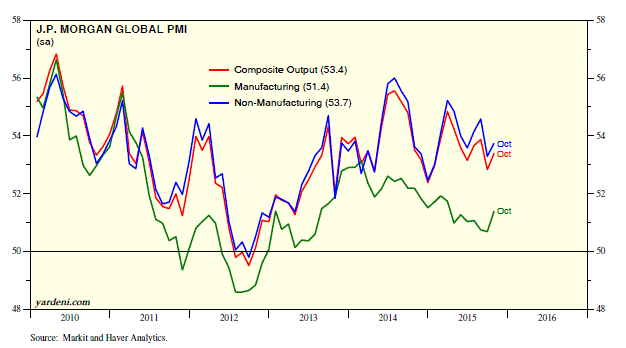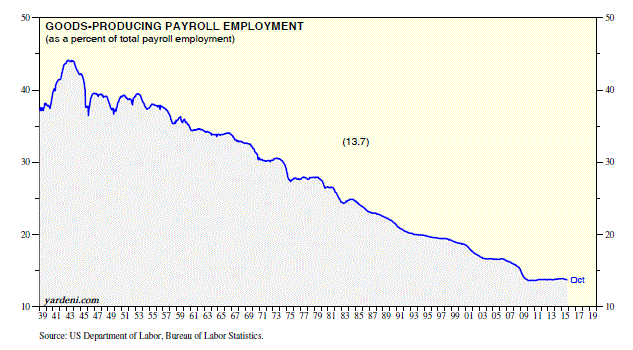
The evolution of national economies tends to follow a well established pattern. They all start out as mostly agricultural economies. They evolve into manufacturing economies. In the next stage of development, services increasingly predominate. In the final stage, economies become knowledge-based. Most emerging economies are currently based on labor-intensive agricultural and manufacturing businesses, but moving towards more services. On balance, most developed nations around the world are in the third stage, with services outpacing manufacturing.
While the recent batch of weak industrial production indexes for Germany (down 1.1% in September), the US (-0.2), the UK (-0.2), Brazil (-1.3), Taiwan, and Singapore (both little changed after big declines) suggests that a global manufacturing downturn may be underway, the increasingly services-led global economy isn’t falling into a recession. Indeed, it seems that services industries are creating enough jobs to boost some of the demand for what factories make, especially autos. Let’s have a closer look:
(1) Global perspective. All this is increasingly evident in the JP Morgan Global PMIs for manufacturing (M-PMI) and non-manufacturing (NM-PMI). The available data we have since 2010 show that the global NM-PMI has generally exceeded the global M-PMI. The spread between the two has actually widened since early 2014. During October, the NM-PMI was 53.7, while the M-PMI was 51.4.
(2) Country perspective. Not surprisingly, these trends—which admittedly are still relatively new and therefore open to debate—can be seen in most of the major economies of the world, since they must add up to the totals compiled by JP Morgan. During October, the spread between the NM-PMI and M-PMI in the US was 9.0ppts, the most since February 2001, and the fourth highest in the history of the series going back to July 1997.
In the Eurozone, the two were nearly identical from 2010 through 2013; but since then, the region’s NM-PMI has been consistently higher than the M-PMI. In China, the NM-PMI has exceeded the M-PMI every month since the start of 2010, with an average spread of 4.4ppts. Interestingly, over the past two years since October 2013, NM-PMIs among emerging market economies have averaged 51.3, while the comparable measure for developed countries has averaged 54.7.
(3) Third-stage economies. Of course, this is all circumstantial evidence of a global transformation from manufacturing to services. However, there is plenty of evidence showing that the major “industrial” economies—including the US, the UK, Canada, Australia, Japan, and the Eurozone countries—have evolved into “services” economies. That’s easiest to see by comparing employment in the services-producing and goods-producing sectors of these economies. The former has been outpacing the latter for at least three decades. A similar conclusion can be deduced by comparing real GDP of goods versus services.
So, for example, in the US, payroll employment in goods-producing industries accounts for only 14% of total payroll employment, down from 44% during 1943. During Q3, services accounted for $9.9 trillion (saar) of real GDP, while goods accounted for $5.3 trillion of real GDP. Since services-producing businesses tend to be less cyclical than goods-producing ones, this transformation should moderate the business cycle.
(4) Know-it-alls. On the other hand, the transformation of the US economy from services-producing industries to knowledge-producing ones may increase the problem of structural unemployment for some workers. That’s because knowledge workers spend their entire workday trying to figure out how to put the rest of us out of work.
They’ve already figured out how to replace factory workers with robots. Indeed, robots are even starting to displace workers in China’s factories. Last year, China was the single largest market for industrial robot sales, according to the International Federation of Robotics (IFR), and within two years there will be more industrial robots in Chinese factories than in either the European Union or the United States.
This is just the start. There are only 30 robots for every 10,000 manufacturing workers in China, compared with 323 per 10,000 in Japan and 437 per 10,000 in South Korea, IFR data show. Automation is also coming to the services sector. San Francisco start-up company Momentum Machines, Inc. has set out to fully automate the production of gourmet-quality hamburgers. McDonald’s (N:MCD) is well on the way to offering self-serve kiosks at a majority of their stores instead of paying employees to ask, “Do you want fries with that?”

